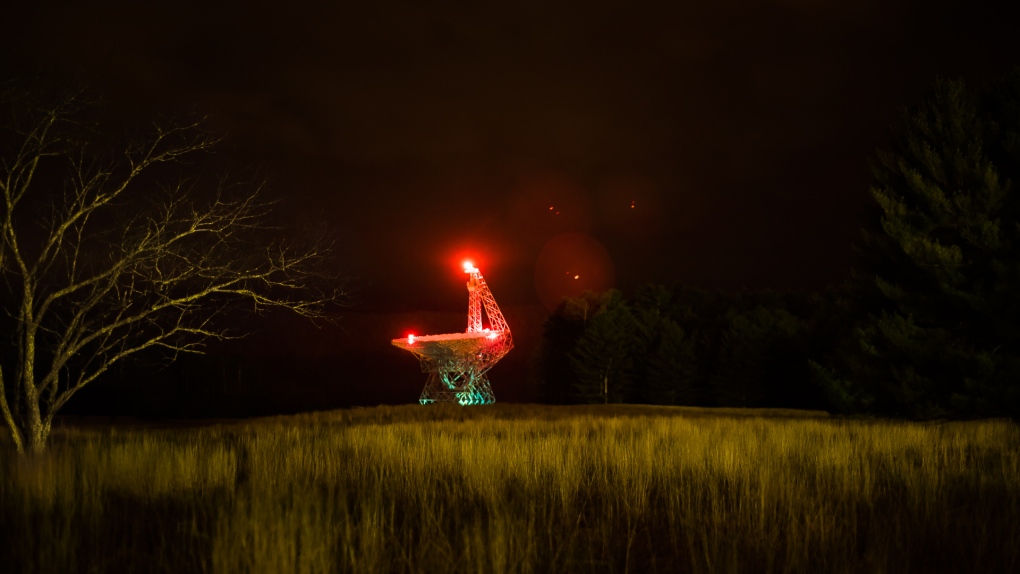Toronto student’s algorithm helps detect radio signals emitting from 5 distant stars
 An element of the Green Bank Telescope used to pinpoint radio signals from space is seen in this undated photograph. (Breakthrough Listen / Chris Schodt)
An element of the Green Bank Telescope used to pinpoint radio signals from space is seen in this undated photograph. (Breakthrough Listen / Chris Schodt)
A new artificial intelligence algorithm created by a Toronto student is helping researchers search the stars for signs of life.
Peter Xiangyuan Ma, a University of Toronto undergraduate student and researcher, said he started working on the algorithm while he was in Grade 12 during the pandemic.
“I was just looking for projects and I was interested in astronomy,” he told CTV News Toronto.
The idea was to help distinguish between technological radio signals created by human technologies and signals that were potentially coming from other forms of life in space.
“What we're looking for is signs of technology that signifies if the sender is intelligent or not. And so unsurprised to us, we keep on finding ourselves,” Ma explained. “We don't want to be looking at our own noisy signals.”
Using this algorithm, Ma said researchers were able to discover eight new radio signals being emitted from five different stars about 30 to 90 light years away from the Earth.
These signals, Ma said, would disappear when researchers looked away from it, which rules out, for the most part, interference from a signal originating from Earth. When they returned to the area, the signal was still there.
“We're all very suspicious and scratching our heads,” he said. “We proved that we found things that we wanted to find … now, what do we do with all these? That's another separate issue.”
- Download our app to get local alerts on your device
- Get the latest local updates right to your inbox
Steve Croft, Project Scientist for Breakthrough Listen on the Green Bank Telescope, the institute whose open source data was the inspiration for Ma’s algorithm, said that finding radio signals in space is like trying to find a needle in a haystack.
“You've got to recognize the haystack itself and make sure that you don't throw the needle away as you're looking at the individual pieces of hay,” Croft, who collaborated on Ma’s research, told CTV News Toronto.
 An image of the Green Bank Telescope is seen here. (Credit Breakthrough Listen / Steve Croft)
An image of the Green Bank Telescope is seen here. (Credit Breakthrough Listen / Steve Croft)
Croft said algorithms being used to discover these signals have to account for multiple characteristics, including the position they are coming from in the sky and whether or not the transmission changes over time, which could indicate if it’s coming from a rotating planet or star.
“The algorithm that Peter developed has enabled us to do this more efficiently,” he said.
The challenge, Croft says, is recognizing that false positives may exist despite a signal meeting this criteria. What could be signs of extraterrestrial life may also just be a “weirdly shaped bit of a haystack,” he added.
“And so that's why we have to go back and look again and see if the signal still there. And with these particular examples that Peter found with his algorithm, the signal was not there when we pointed the telescope back again. And so we sort of can't say one way or another, is this genuine?”
Researchers have been searching the sky for technologically-generated signals since the 1960s, searching thousands of stars and galaxies for signs of intelligent life. The process is called “SETI,” or “the Search for Extraterrestrial Intelligence.”
But interference from our own radio signals has always proven to be a challenge. Croft says most pieces of technology have some kind of Bluetooth or wireless wave element that creates static, resulting in larger amounts of data needed to be collected.
“That's a challenge but also computing provides the solution,” he said.
“So the computing and particularly the machine-learning algorithms gives us the power to search through this big haystack, looking for the needle of an interesting signal.”
Ma said that while we may not have found a “technosignal” just yet, we shouldn’t give up. The next step would be to employ multiple kinds of search algorithms to find more and more signals to study.
 Peter Ma is seen in this photograph taken in 2021. (Adar Kahiri)
Peter Ma is seen in this photograph taken in 2021. (Adar Kahiri)
While the “dream” is to find evidence of life, Ma says he is more focused on the scientific efforts of actively looking for it.
This sentiment is echoed by Croft, who said he is most fascinating in working towards answering the question of whether humans are alone in this universe.
“I don't show up to work every day, thinking I'm going to find aliens, but I do show up for work. So you know, I've got sort of some optimism.”
CTVNews.ca Top Stories

Budget 2024 'likely to be the worst' in decades, former BoC governor says
Without having seen it, former Bank of Canada governor David Dodge believes that Tuesday's 2024 federal budget from Deputy Prime Minister and Finance Minister Chrystia Freeland is 'likely to be the worst budget' in decades.
What's at stake for Canada after Iran's unprecedented attack on Israel
Following the Iranian missile and drone strikes against Israel over the weekend, Canada should take the threat of Iran and potential escalation of the conflict seriously, one global affairs analyst says.
Former B.C. school trustee's 'strip-tease artist' remark was defamatory, judge rules
A controversial former school trustee from B.C.'s Fraser Valley who described a political rival as a "strip-tease artist" during an election campaign has been ordered to pay her $45,000 for defamation.
'A sense of urgency': Sask. man accused of abducting daughter calls himself to the stand during trial
Michael Gordon Jackson, the man on trial after being charged with contravention of a custody order for allegedly abducting his daughter in late 2021 to prevent her from getting a COVID-19 vaccine, called himself to the stand Monday.
Kingston, Ont.'s Aaliyah Edwards drafted into WNBA
After four years at the University of Connecticut, Edwards was selected sixth overall by the Washington Mystics in the WNBA draft Monday night.
NASA confirms mystery object that crashed through roof of Florida home came from space station
NASA confirmed Monday that a mystery object that crashed through the roof of a Florida home last month was a chunk of space junk from equipment discarded at the International Space Station.
A knife attack in Australia against a bishop and a priest is being treated as terrorism, police say
Horrified worshippers watched online and in person as a bishop was stabbed at the altar during a church service in Sydney on Sunday evening.
Body of 14-year-old boy pulled from Lake Ontario, police say he drowned while swimming
The body of a 14-year-old boy has been pulled from Lake Ontario after police say he drowned while swimming near Ashbridges Bay Park on Sunday night.
'Rust' armourer gets 18 months in prison for fatal shooting by Alec Baldwin on set
A movie weapons supervisor was sentenced to 18 months in prison in the fatal shooting of a cinematographer by Alec Baldwin on the set of 'Rust.'
































